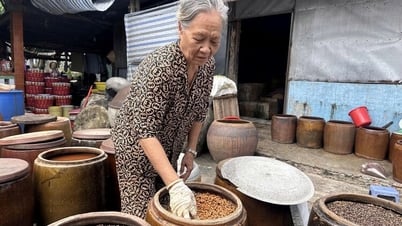
Mr. Duc Trinh, Chairman of the Vietnam Musicians Association, said he was informed of the artist's death on May 11th by her son. The wake will be held at 7:00 AM on May 14th at the Funeral Home of Military Hospital 17, No. 3 Nguyen Phi Khanh Street, Da Nang City. The funeral service will take place at 12:00 PM on the same day, and the remains will be interred at the Military Cemetery of Military Region 5.
On her personal page from the US, singer Ngoc Anh (from the 3A trio) - Tuong Vi's former daughter-in-law - posted a photo in memory of her mother-in-law: "Goodbye, dear mother. Thank you for always remembering me and your grandchildren. We couldn't come back in time to say goodbye, but we will visit regularly as I have always visited you in the past months. I love you so much."
Composer Duc Trinh stated that he has long regarded the artist as a classic voice of the revolutionary genre, a master of vocal music. According to him, songs like "The Girl Sharpening Bamboo Stakes," "Light the Fire, My Dear," and "The Sound of the Ta Lu Guitar," when performed by her, are difficult for many later singers to match. "What I admire most about the artist is her dedication in opening music classes for underprivileged children, as well as the many musical works she has taught that she has left for future generations," he said.
People's Artist Tuong Vi was born in Tam Ky, Quang Nam . From a young age, she showed a talent and passion for singing. At the age of 16, after the shock of her grandmother's death due to bombing, she volunteered to join the army and became a nurse at Military Hospital 108 to treat soldiers.
In 1956, she transferred to the General Political Department's song and dance troupe and began studying vocal music. There, she displayed her talent with a bright, clear soprano voice, as bright and melodious as a bird's song. She graduated from the Vocal Music Department of the Hanoi Conservatory of Music (now the Vietnam National Academy of Music) in 1967. In 1974, she studied at the Sofia Conservatory of Music in Bulgaria. During the war years, Tuong Vi traveled with the performing arts troupe to perform in many places across the battlefields.
She recorded many famous songs such as: "Tiếng đàn Ta Lư" (The Ta Lư Guitar), "Cô gái vót chông" (The Girl Sharpening Bamboo Stakes), "Em là hoa Pơ Lang" (You Are the Pơ Lang Flower), and "Người con gái sông La" (The Girl of the La River). Among them, "Cô gái vót chông" (Hoang Hiep) cemented her reputation and became a benchmark for many generations. Tuong Vi once said that when reading the lyrics, she envisioned the vast forests of the Central Highlands teeming with animals and plants. From there, she creatively added a staccato note section with head voice mimicking bird songs to the song.
She possesses a lyrical coloratura soprano voice – a type of voice not commonly found in Vietnam, unlike many female voices in revolutionary music which are lyrical sopranos (lirico sopranos). With a wide and versatile vocal range, she can sing at a fast tempo and reach soaring high notes beyond the typical female vocal range.
In 1992, she opened a music class for orphaned children, and later established the Center for Compassionate Arts, with the aim of nurturing and training disabled and orphaned children in the arts. The center was once visited by General Vo Nguyen Giap.
She also composed songs such as: "Our Squadron Takes Off," "My Homeland is the Sea," "I Listen to the Voice of Life," "Life Gives Me Joyful Notes," "Oh Heart, Don't Be Sad," and "A Child's Dream Is Peace ." She was awarded the title of Meritorious Artist in 1984 and People's Artist in 1993. She also had the honor of being one of the rare artists listed in the Vietnamese Military Encyclopedia, published in 1996.
TB (according to Tuoi Tre newspaper)Source








![[Photo] General Secretary To Lam works and extends New Year greetings to the Party Committee, government and people of Dak Lak province.](https://vphoto.vietnam.vn/thumb/1200x675/vietnam/resource/IMAGE/2026/02/11/1770808701306_ndo_tl_img-4099-5201-jpg.webp)




































































































Comment (0)